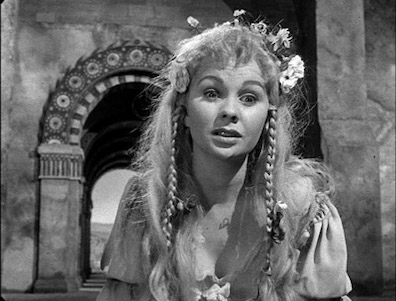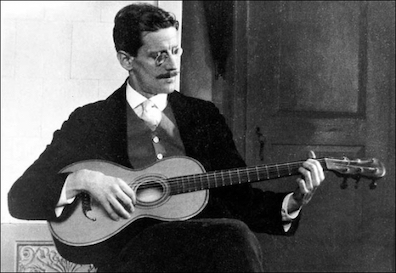In act 4 scene 5 of Hamlet the maddened Ophelia
visits the King and Queen, "distracted, with her hair down,
playing on a lute." She sings stanzas from two or three
Elizabethan ballads that have seemingly been prompted by the
sudden death of her father Polonius and her sudden abandonment
by prince Hamlet. The last tells the story of a young woman
who loses her virginity on Saint Valentine's day. "Before
you tumbled me," she says to the young man, "You
promis'd me to wed." He replies, "So would I 'a' done, by
yonder sun, / And thou hadst not come to my bed." Two lines
are especially memorable. Ophelia sings,
Young men will do't if they come to't,
By cock, they are to blame. (4.5.60-61)
This is one of several suggestions in Hamlet that the
prince may have been sexually involved with Ophelia before
casting her out of his life. Stephen turns the gender dynamics
around, speaking of "a boldfaced Stratford wench who tumbles
in a cornfield a lover younger than herself" before betraying
him sexually. He says of Anne, who was eight years older than
Shakespeare, "By cock, she was to blame." The context
is much the same as in the ballad: a moment of sexual delight
engenders a lifetime of regret. (The French song Plaisir
d'amour memorably expresses the same thought.) But now
it is a woman whose desire has unmade a man.
Stephen also says of Anne, "She put the comether on him,
sweet and twentysix." The come-hither needs no glossing,
but "sweet and twenty" alludes to "O Mistress Mine" in Twelfth
Night, a carpe diem song performed by the clown
Feste:
What is love? 'Tis not hereafter;
Present mirth hath present laughter;
What's to come is still unsure.
In delay there lies no plenty,
Then come kiss me sweet and twenty;
Youth's a stuff will not endure. (2.3.47-52)
This song communicates the opposite of Ophelia's bitter
regret, urging a young woman to enjoy the moment because love
does not last, the future is "unsure," and postponing pleasure
yields no "plenty." The last word may possibly suggest that
pregnancy is a welcome outcome of lovemaking––an unspoken and
unhappy undercurrent in Ophelia's song that Stephen may be
echoing when he calls Anne's bending over Will a "prologue to
the swelling act." (It is true, however, that other things do
swell in the act of sex.) The children that resulted from
Anne's seduction play a large part in Stephen's account of
Shakespeare's life and art. Anne was 26 when she married Will.
And she may have been pregnant when they married.
A third Shakespeare play is echoed when Stephen describes
Anne seducing Will "in a cornfield." This carpe
diem song is performed by two young attendants in the
penultimate scene of As You Like It. In that scene
Touchstone anticipates his coming marriage to the dullwitted
but comely country lass Audrey, a union precipitated on his
part solely by sexual desire. (Several of Shakespeare's works,
including Hamlet, play on the sexual suggestions of
"country." Joyce no doubt appreciated the pun.) The song
begins,
It was a lover and his lass,
With a hey, and a ho, and a hey nonino,
That o'er the green corn-field did pass,
In spring time, the only pretty ring time,
When birds do sing, hey ding a ding a ding,
Sweet lovers love the spring.
Between the acres of the rye,
With a hey, and a ho, and a hey nonino,
These pretty country folks would lie,
In spring time, etc. (5.3.16-25)
Mr. Best corrects Stephen on "cornfield," saying it should be
"Ryefield." He then recites the two lines about pretty
countryfolk copulating in the rye. Stephen, dogged in his
determination to win over every skeptical listener, and
magpie-like in his eagerness to incorporate shiny found bits
into his talk, later accepts Mr. Best's emendation when he
talks about the unmanning effect that Anne's seduction had on
Shakespeare: "Belief in himself has been untimely killed. He
was overborne in a cornfield first (ryefield, I should say)
and he will never be a victor in his own eyes after nor play
victoriously the game of laugh and lie down."
But the word "cornfield" in fact appears in the song's third
line––and, furthermore, there is no contradiction between the
two terms. Rye is one species of cereal grain, but in
Elizabethan times "corn" could refer to the seeds of virtually
any plant. The first meaning listed in the OED, "A
grain, a seed," was in use from the time of King Ælfred until
the late 19th century. People spoke of pepper-corn,
barley-corn, and many other kinds, including the "Indian corn"
that was grown in the New World. Only after maize was brought
back to England in the 17th and 18th centuries did the word
begin to refer exclusively to this one grain. For
Shakespeare's audiences, rye was something that might be grown
in a "cornfield." And for Shakespeare, incidentally, fields of
any kind of seed crop might suggest impregnation. Enobarbus
uses such a metaphor in Antony and Cleopatra: "Royal
wench! / She made great Caesar lay his sword to bed; / He
ploughed her, and she cropped" (2.2.226-28).
At the end of Eumaeus Stephen tells Bloom of his
fondness for Elizabethan lute songs––he loves them so much
that he wants to acquire an expensive instrument to play as he
sings them. This passion intersects with his interest in
Shakespeare, because Shakespeare featured such songs in play
after play. Ulysses echoes others besides the three
referenced in "tumbles," "cock," "sweet and twenty," and
"cornfield." Later in Scylla and Charybdis Buck
Mulligan says, "Cuckoo, cuckoo.... O word of
fear!," alluding to one of two remarkable lute songs at the
end of Love's Labour's Lost. In Proteus, "Full
fathom five thy father lies" echoes the beautiful lute
song that Ariel sings for Ferdinand's benefit in the first act
of The Tempest. In Eumaeus "Tell me, where is
fancy bred?," from the third act of The Merchant of Venice,
becomes garbled into an ad jingle for fancy bread
in Bloom's mind. These songs stamped Joyce's aural imagination
as indelibly as any operatic aria or music hall ditty.

